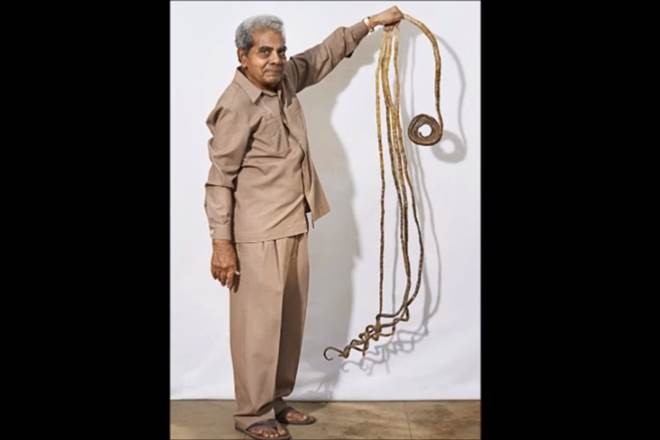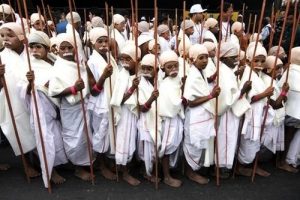Guinness World Records, known until 2000 as The Guinness Book of Records (and in previous U.S. editions as The Guinness Book of World Records), is a reference book published annually, containing an internationally recognized collection of world records, both human achievements and the extremes of the natural world. The book has the biggest best-selling copyrighted series of all-time. It is said that this is one of the most stolen books from public libraries in the United States!

It took birth in 1955 and is the brainchild of Sir Hugh Beaver. The idea came about in the early 1950’s when Sir Hugh Beaver (1890—1967), Managing Director of the Guinness Brewery, attended a shooting party in County Wexford. There, he and his hosts argued about the fastest game bird in Europe, and failed to find an answer in any reference book. Hence, Hugh Beaver decided to have one such Book of World Records. He invited the twins Norris and Ross McWhirter who were fact-finding researchers from Fleet Street, London to compile a book of facts and figures. The book was named after his breweries Guinness.
Therefore, the credit as co-founders goes to brothers Norris and Ross McWhirter who started their work in 1954. As of the 2018 edition, it is 63rd year of publication. It is published in 100 countries and 23 languages. The international franchise has extended beyond print to include television series and museums. The popularity of the franchise has resulted in Guinness World Records becoming the primary international authority on the cataloguing and verification of a huge number of world records; the organisation employs official record adjudicators authorised to verify the authenticity of the setting and breaking of records. The Vision of the Guinness World Record is “To make the amazing official.” Their mission is “To be the ultimate global authority on record breaking”. Their values are: Integrity, Respect, Inclusiveness and Passion.
Over the world, people go crazy to appear in the Guinness World Records; they love to compete against others to be able to break the record mentioned in the Guinness Book. Some of the categories are weird: spitting a watermelon seed for distance (the record is 68 feet, 9 1/8 inches), gathering the world’s largest ball of string (the winning ball is almost 13 feet across and weighs 11 tons), somersaulting (the record is 12.25 miles along the route of Paul Revere’s famous ride in Massachusetts) the longest moustache in world (the record is 4.29 m (14 ft) and belongs to Ram Singh Chauhan (India), the longest kiss (the record is that it lasted 58 hours, 35 minutes and 58 seconds, achieved by Ekkachai Tiranarat and Laksana Tiranarat, Thailand), Tallest dog, heaviest onion, longest tongue, fastest woman marathon, most press-ups in an hour, tallest man, oldest person, maximum socks put on a foot in a minutes etc.
Some other categories being Gluttony, Heaviest pets, Speedy driving around the world, Controversial animal sports, Environmental challenges (sky lanterns flown), Oldest Criminal gang. And, some of the dangerous records categories are: The Strongest Kick To The Groin, Largest Airplane Eaten, Most Live Rattlesnakes Held In Mouth (ugh), Most Motorcycles Driven Over The Body While Lying On A Bed Of Nails, Highest Blood Alcohol Content, Highest Pool Dive, Highest Free-Fall Parachute Jump, Heaviest Car Balanced On Head , Re-breather Deep Diving etc. Can you imagine doing any of these?
Because we have something like Guinness World Records, the need for achievement pushes people to chase success in a number of areas. It can be anything – the nature of the skill becomes less important than the fact that it exists. The Guinness World Record has motivated people to set records, to break previous records; it satisfies the achiever’s desires. The record book has created an extraordinary niche for achievements. By setting an incomprehensible record may not give the achiever widespread celebrity status, but almost everyone who’s been declared “officially amazing” (the Guinness motto) has received the distinction specifically because they took the steps to make sure to reach there and it became an official record.
The record breakers don’t get paid for their achievements. The company receives 40,000 to 50,000 applications each year, only around 5 percent become official world records. The achievement fever is so high, that people who try to break the record sometimes waste their money, time and energy. At times, they even risk their lives. The officials at Guinness say that they hear from tens of thousands of people each year who want to set a record. Guinness officials may take more than a month to decide if they will accept a record-breaking attempt or not. They reject about eighty percent of the applications. For those interested, the Guinness World Records website has a section called ‘’Set a Record’’. It says a record should be “provable, quantifiable and breakable.”
There are a few unique Guinness world records created by Indians. World’s longest turban, World’s shortest woman, World’s longest moustache, most numbers of Mahatma Gandhis at one place (484 kids from Kolkata dressed as Mahatma Gandhi, Father of the Nation, the record for the largest gathering from a charity for single mothers and kids, Training Resource and Care for Kids, walked as part of a peace march to make the record), World’s biggest chapatti, biggest numbers selfies clickers together (1000 frames in a minute), most expensive wedding, largest amount of biryani ever cooked, typing fast only by using nose, farthest distance by limbo skating under car, World’s largest condom mosaic, most hugs given in an hour, shortest cow in the world and longest solo dance marathon.
The craze of getting into Guinness World Records is ever soaring that people have braved extreme conditions, done weird things, spent lot of money, and lived in worst conditions just to be there in the Guinness World Records. There is no substitute to this extra ordinary world record.














































